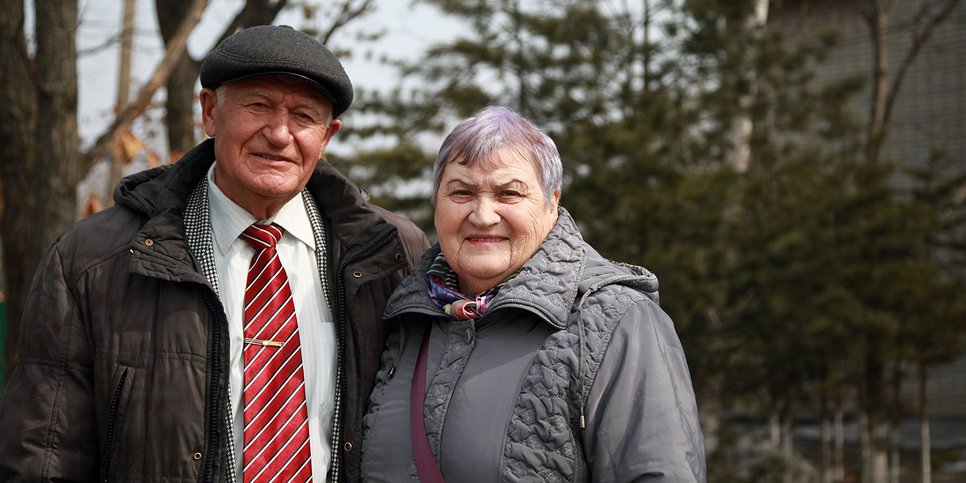In the photo: Vladimir Filippov with his wife, March 15, 2021
In the photo: Vladimir Filippov with his wife, March 15, 2021
A Primorye-based former military man Vladimir Filippov was convicted and received a six year suspended sentence because of his faith in Jehovah God
Primorye TerritoryOn March 15, 2021, Diana Merzlyakova, the Nadezhdinsky District Court judge of the Primorsky Territory, determined that the participation of the 77-year-old Vladimir Filippov in peaceful religious services is considered extremism and handed him a six-year suspended sentence with a further probationary period of four years and a restriction on the freedom of movement for one year.
The believer is also deprived of the right to engage in activities related to participation in public organizations for a period of 3 years. The verdict did not enter into force. Vladimir Filippov does not admit his guilt and intends to appeal against him. Despite the fact that there is not a single victim in the case, the prosecutor Maria Koval requested 6.5 years in a general regime colony and 2 years of additional restrictions for the believer.
In his last speech, Vladimir Filippov said: “I have never participated in extremist affairs, did not show and do not show hatred towards people of other nationalities and religions ... I did not commit a crime, but only used my constitutional right to believe in Jehovah God and live in agreement with their religious convictions. "
The case under Part 1 of Art. 282.2 of the Criminal Code of the Russian Federation (organization of extremist activity) against a resident of the village of Razdolnoye Vladimir Filippov was instituted on July 1, 2019. But a year earlier, on July 19, 2018, in another case, in which Filippov was a witness, armed law enforcement officers wearing masks broke into the homes of local believers. One of the security officials hit the elderly Vladimir Filippov in the face. About a year later, already in the case against Filippov himself, a second search took place in his apartment. Then the wife of Vladimir, Lyubov, due to stress, suffered a hypertensive crisis and needed medical attention. On January 10, 2020, a court sanctioned the third search in the homes of peaceful believers. The search took place on January 22, 2020, law enforcement officers seized cell phones from the elderly couple of Filippovs.
Vladimir Filippov was under surveillance. Security officials secretly filmed peaceful religious meetings of local Jehovah's Witnesses, and a B. Ulyankin, portraying an interest in the Bible, recorded a conversation with Vladimir Filippov. The investigation used the obtained materials to present Filippov as the “head of a banned organization”.
In the case against Vladimir Filippov, a psychological, linguistic and religious examination was also used, which was prepared by Nadezhda Oleshkevich, Associate Professor of the Department of Philosophy and Legal Psychology. She arbitrarily chose an article on the Internet with biased information about Jehovah's Witnesses and, on this basis, built a conclusion about the "hostility" of the believer's religion towards the state. At the same time, the expert did not provide evidence of any specific hostile actions or crimes in the conclusion.
On May 19, 2020, after almost three years of investigation, which was conducted by Denis Shevchenko, CO investigator for the Nadezhdinskiy district of the Investigative Committee of Russia, Filippov's case was brought to court. For more than 10 months, the believer has been under recognizance not to leave.
Vladimir Filippov has not been previously convicted. Before coming to faith, he devoted 27 years to military service.
The verdict to Vladimir Filippov was the first in the region. At the moment, 33 believers are undergoing 20 criminal cases in Primorye, including Filippov's fellow villager, 73-year-old Lyudmila Shut.
Well-known human rights activists and public figures unanimously condemn and demand to stop the persecution of Jehovah's Witnesses in Russia. The Russian government has repeatedly stated that the decisions of the Russian courts on the liquidation and prohibition of organizations of Jehovah's Witnesses "do not assess the doctrine of Jehovah's Witnesses, do not contain a restriction or prohibition to practice the above teachings individually."
